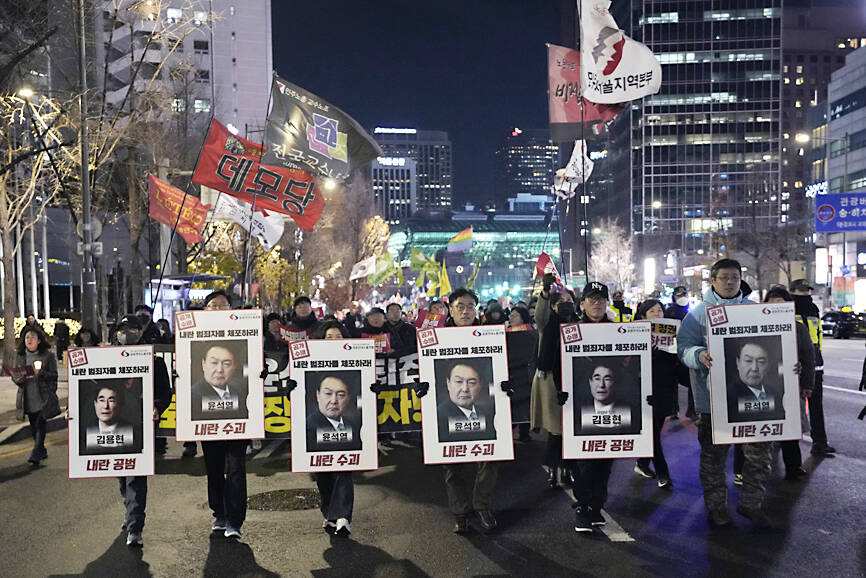South Korea’s president replaced his defense minister yesterday as opposition parties moved to impeach both men over the stunning-but-brief imposition of martial law that brought armed troops into Seoul’s streets.
The Democratic Party and other small opposition parties submitted a joint motion to impeach South Korean President Yoon Suk-yeol early yesterday over his martial law declaration on Tuesday. Martial law lasted about six hours, as the National Assembly quickly voted to overrule the president, forcing his Cabinet to lift it before daybreak Wednesday.
Democratic Party spokesperson Jo Seoung-lae said it would push for a National Assembly vote on Yoon’s impeachment motion tomorrow, calling his martial law declaration an “unconstitutional, illegal rebellion or coup.”

Photo: AP
Yesterday, Yoon’s office said he decided to replace South Korean Minister of National Defense Kim Yong-hyun with Choi Byung-hyuk, a retired general who is South Korea’s ambassador to Saudi Arabia.
Yoon’s office did not provide any further comments by him. He has not appeared in public since his televised announcement that martial law was lifted.
The opposition parties earlier submitted a motion to impeach Kim, alleging he recommended that Yoon impose martial law. Kim had offered to resign and apologized for causing disruption and concern to the public.
Kim said that “all troops who performed duties related to martial law were acting on my instructions, and all responsibility lies with me,” the South Korean Ministry of National Defense said.
If Yoon is impeached, he would be suspended until the Constitutional Court rules on whether to remove him from office or restore his presidential power. South Korean Prime Minister Han Duck-soo would take over presidential responsibilities.
The impeachment motion against Yoon says he failed to meet the constitutional requirement that martial law should only be considered in wartime or a comparable severe crisis.
It alleges he attempted a “self-coup” by mobilizing the military and that suspending political party activities and deploying troops to seal the National Assembly amounted to rebellion.
Thousands of protesters marched in Seoul’s streets on Wednesday, carrying candles and signs calling for Yoon to step down, and another large anti-government gathering was expected yesterday evening.
Reflecting the country’s deeply polarized politics, hundreds of Yoon’s conservative supporters rallied in downtown Seoul yesterday afternoon, holding signs criticizing Democratic Party leader Lee Jae-myung, seen as a potential successor to Yoon despite facing trials over various corruption allegations.

AT RISK: The council reiterated that people should seriously consider the necessity of visiting China, after Beijing passed 22 guidelines to punish ‘die-hard’ separatists The Mainland Affairs Council (MAC) has since Jan. 1 last year received 65 petitions regarding Taiwanese who were interrogated or detained in China, MAC Minister Chiu Chui-cheng (邱垂正) said yesterday. Fifty-two either went missing or had their personal freedoms restricted, with some put in criminal detention, while 13 were interrogated and temporarily detained, he said in a radio interview. On June 21 last year, China announced 22 guidelines to punish “die-hard Taiwanese independence separatists,” allowing Chinese courts to try people in absentia. The guidelines are uncivilized and inhumane, allowing Beijing to seize assets and issue the death penalty, with no regard for potential

STILL COMMITTED: The US opposes any forced change to the ‘status quo’ in the Strait, but also does not seek conflict, US Secretary of State Marco Rubio said US President Donald Trump’s administration released US$5.3 billion in previously frozen foreign aid, including US$870 million in security exemptions for programs in Taiwan, a list of exemptions reviewed by Reuters showed. Trump ordered a 90-day pause on foreign aid shortly after taking office on Jan. 20, halting funding for everything from programs that fight starvation and deadly diseases to providing shelters for millions of displaced people across the globe. US Secretary of State Marco Rubio, who has said that all foreign assistance must align with Trump’s “America First” priorities, issued waivers late last month on military aid to Israel and Egypt, the

‘UNITED FRONT’ FRONTS: Barring contact with Huaqiao and Jinan universities is needed to stop China targeting Taiwanese students, the education minister said Taiwan has blacklisted two Chinese universities from conducting academic exchange programs in the nation after reports that the institutes are arms of Beijing’s United Front Work Department, Minister of Education Cheng Ying-yao (鄭英耀) said in an exclusive interview with the Chinese-language Liberty Times (the Taipei Times’ sister paper) published yesterday. China’s Huaqiao University in Xiamen and Quanzhou, as well as Jinan University in Guangzhou, which have 600 and 1,500 Taiwanese on their rolls respectively, are under direct control of the Chinese government’s political warfare branch, Cheng said, citing reports by national security officials. A comprehensive ban on Taiwanese institutions collaborating or

France’s nuclear-powered aircraft carrier and accompanying warships were in the Philippines yesterday after holding combat drills with Philippine forces in the disputed South China Sea in a show of firepower that would likely antagonize China. The Charles de Gaulle on Friday docked at Subic Bay, a former US naval base northwest of Manila, for a break after more than two months of deployment in the Indo-Pacific region. The French carrier engaged with security allies for contingency readiness and to promote regional security, including with Philippine forces, navy ships and fighter jets. They held anti-submarine warfare drills and aerial combat training on Friday in